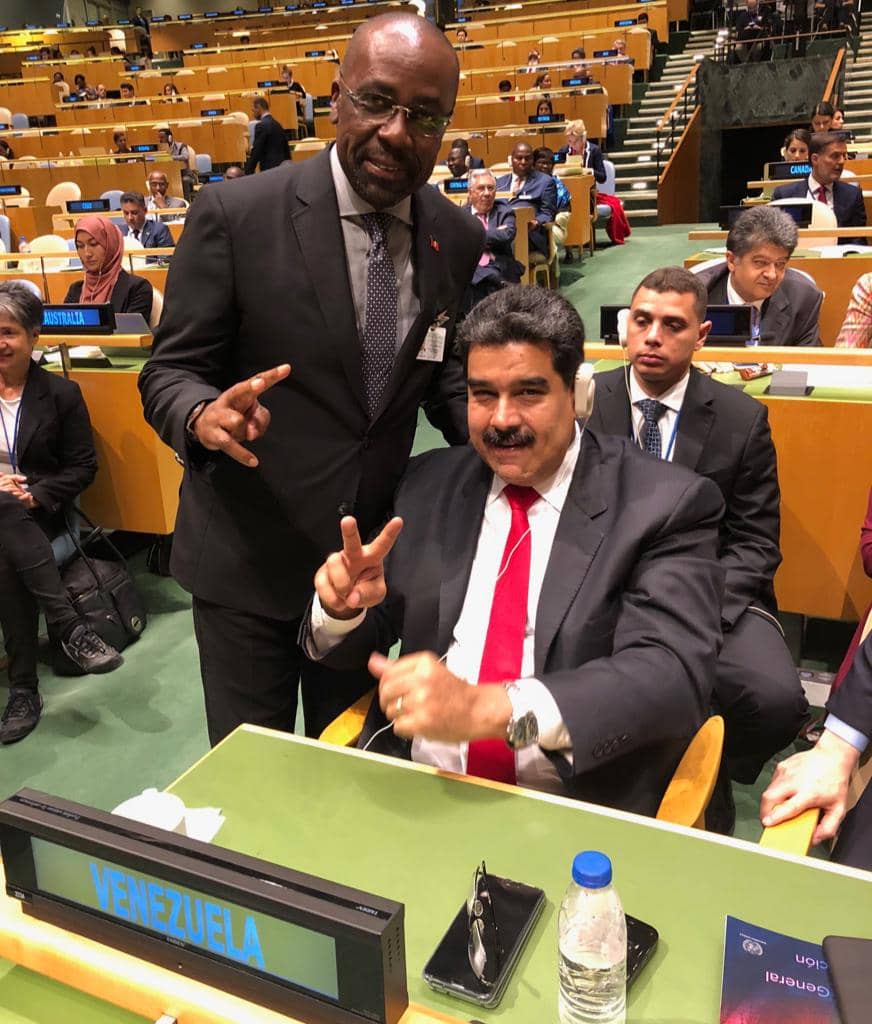
The Organization of American States (OAS) ended its 49th General Assembly here on Friday with Caribbean Community (CARICOM) countries still divided on the situation in Venezuela.
As they have done in the past, St. Lucia, Jamaica, Haiti and the Bahamas broke ranks with the wider Caribbean Community (CARICOM) grouping and voted in support of a resolution on the situation in Venezuela. Bahamas will host the 50th OAS General Assembly in 2020.

But, Antigua and Barbuda Foreign Affairs Minister Chet Greene in a statement following the vote on the resolution that included a paragraph that accepted the seating of a designee of the opposition-controlled National Assembly of Venezuela as the representative of Venezuela, said his country could not accept the resolution.
“While we are concerned about the flow of migrants from Venezuela into other states and we sympathize with the burden being placed upon the g\Governments and people of those states, we recognize that the causes of migration from Venezuela are many; some flow from external actors not reflected in this resolution,” Greene said.
He said further the Antigua and Barbuda government has acknowledged that Venezuela has withdrawn from the OAS in accordance with the relevant article of the OAS Charter.
“Therefore, we do not consider it to be a member-state of the OAS. Antigua and Barbuda, like the vast majority of nations of the world and international organizations such as the United Nations, also recognizes the de facto government of Venezuela.”
He said in this connection, St. John’s has rejected “each of the Resolutions adopted by a simple majority that have been named in this present resolution before us.
“Indeed, we are persuaded, by legal advice, that the method employed in the Permanent Council, to seat a nominee of the National Assembly of Venezuela as a representative, was ultra vires of the OAS Charter and the rules of the Permanent Council.

“It is a matter of record that Antigua and Barbuda formally registered at the Permanent Council that it reserves its right not to accept or be bound by any resolutions, declarations or positions of the Permanent Council or any other organs of the OAS by a majority of 18 states that includes the purported representative of Venezuela.”
Greene insists that the resolution before the OAS is designed to “repeat the same process of seating a designee of the National Assembly of Venezuela that my delegation rejected in the Permanent Council.
“This General Assembly is the supreme decision-making body of our Organization. Its decisions, collectively made by all member states, bind all organs of this Institution. But, delegations cannot bound by a decision made only by a simple majority that disregards and discounts the legitimate rights and positions of other member states.
“We wish it to be noted that we continue to reserve our rights not to recognize any resolutions or declarations adopted with the participation of a non-member state or anyone purporting to be a representative of a non-member state.”
Opposition political parties in Venezuela, backed by the United States and some other western countries are seeking to remove President Nicolas Maduro from office and replace him with Opposition Leader Juan Guaido.
CARICOM countries have repeatedly indicated their position of non-interference and non-intervention in the internal affairs of the South American country.
The OAS resolution, which had received thr support of 19 member states, urges “support the peaceful restoration of democracy in Venezuela, led by the people of Venezuela, guided by the Venezuelan Constitution and urge that free, fair, transparent and legitimate presidential elections be convened as soon as possible”
Meanwhile, the OAS Working Group on Venezuelan has presented a report on the situation in Caracas noting that if the existing problems in Venezuela continue or worsen, “the projection of Venezuelan migrants and refugees could reach between 5.3 and 5.7 million by the end of 2019 and between 7.5 and 8.2 million by the end of 2020.”
The group calls on the on the entire international community “to give a global response to the crisis of Venezuelan migrants and refugees.
“This should not be considered a regional or much less sub-regional issue. It also highlights that this crisis of migrants and refugees represents an unprecedented challenge in the region for the member countries of the OAS and the rest of the international community.
“Despite the difficulties, the migrant and refugee crisis also creates an immense opportunity to integrate millions who are willing to work, study, and positively impact the countries that receive them.”
It said defining Venezuelans who fled, and continue to flee, their country as refugees “will guarantee them permanent protection with the right to identity, access to services such as health and education, and the opportunity to enter the labour markets.
“Today, approximately two million Venezuelans are in irregular status or at risk of being so in the short term,” the group said in its report, which also calls for the creation of a regional identity card so that Venezuelans can move from one country to another without major restrictions.
“At the time of this General Assembly there are 4 million Venezuelan migrants and refugees, the largest migratory flow in the history of the region,” said the coordinator of the Working Group, David Smolansky.
“It is currently the second largest in the world, second only to Syria, which has endured a war for more than 8 years,” he said, adding that given the serious situation, “it is imperative to grant Venezuelans refugee status at the regional level, according to the Cartagena Declaration.”
According to the reported presented to the OAS General Assembly, while most of the Venezuelans fleeing the economic and political situation in their homeland, most of them could be found in Latin and Central America.
However, the report notes that two CARICOM countries, namely Trinidad and Tobago and Guyana have between them accommodated 76,000 Venezuelans with Port of Spain accounting for 40,000 people.
This is in mark contract to statements made by the Trinidad and Tobago government following a two-week registration exercise that there are just over 16,000 Venezuelans here. The government has since introduced visa requirements for Venezuelans wanting to enter the country.
OAs Secretary General, Luis Almagro, a constant critic of Maduro told the OAS Assembly that “Venezuelans need our help and they need it now.
“We must implement all possible measures that help mitigate the drama they face. But let’s not lose sight of the fact that the exodus has only one cause: the dictatorship of Nicolás Maduro. The best solution for the crisis of Venezuelan migrants and refugees is the end of the dictatorship and the redemocratization of Venezuela where the most basic human rights that have been taken from people are restored,” he said.
Advertise with the mоѕt vіѕіtеd nеwѕ ѕіtе іn Antigua!
We offer fully customizable and flexible digital marketing packages.
Contact us at [email protected]















